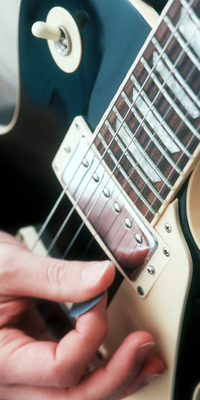Rock Guitar Basics
Want to master rock guitar? First you need to concentrate on some rock guitar basics that I talk about below so you have a clear understanding of what's involved in learning and playing rock guitar. If you have any questions, please let me know.
Rock Guitar Basics #1: Sound
The sound of rock guitar is relatively easy to describe. At
least since the late 1960s, rock music has been characterized by the
sound of an electric guitar plugged into a guitar amp set for either a
mild to extreme "overdriven" or distorted tone. This sound was actually
discovered by accident. Ray Davies of the Kinks had poked holes in his
guitar cabinet's speaker cones with a pencil, trying to get a different
sound. The "crunchy" sound he discovered would become a distinctive part
of the rock guitar sound.
Rock guitarists don't always have to
play with a distorted sound or even with an electric guitar. Still, the
difference between a folk guitarist and a rock guitarist is attitude,
and that attitude is usually communicated with a too-loud electric
guitar and amplifier.
Most rock guitarists use sound-modifying
devices called "effects" to get the wide range of sounds you hear in
their music. Like the intro to Heart's "Barracuda"? That's a typical
"flanger" sound. Dig the intro to U2's "Where the Streets Have No Name"?
That's primarily due to an effect called "delay." Some guitarists have
become almost synonymous with their effects. A good deal of Eddie Van
Halen's solos wouldn't sound the same without a device called a "phaser"
(and no, it doesn't kill people, unless they hate Van Halen). Still,
the main sound of rock guitar is a distorted electric guitar, and that's
something that every band from AC/DC to ZZ Top has in common.
Rock Guitar Basics #2: Style
Rock
music is rooted in the blues, so it's no surprise that there's a good
deal of crossover between blues guitar and rock guitar. With some
players - Eric Clapton, Billy Gibbons, Jeff Beck - it's hard to even
tell the difference.
 Gibson Les Paul
Gibson Les PaulIn rock music, there's a heavy emphasis on
the strong beats (beats 1 and 3 for you music types). Rock guitar (and its
"cousins" shred and metal) tends to favor partial chords called "power
chords" that sound great with distortion. If there's any element to mastering rock guitar basics that you need to master first, it's definitely power chords.
Most rock tunes tend
to have a guitar solo as well - usually after the second chorus. Some
players tend to favor really fast and highly technical solos (like Steve
Vai) while others gravitate more towards blues and more classic rock
(like David Grissom). There really aren't any rules when it comes to a
good solo except that it needs to take the song somewhere. A tasteful,
melodic, and slow solo is a lot better than a thousand notes played with
no style. But a tasty fast solo is better than a boring slow one.
Still,
it's best for beginning rock guitarists to master different techniques
so that they can play a variety of styles. But at the beginning, it's
best to focus on developing a good sense of timing, learning a number of
basic chords and how to use them, and playing some simple yet tasty
guitar solos.
You'll also want to learn some basic scales. A
scale, by the way, is just a grouping of individual notes played in a
particular pattern. Some scales are harder to learn than others, but
some of the most popular scales used in rock guitar are (1) easy to
learn and (2) used by pretty much everyone, even if they don't know
they're using scales.
Rock Guitar Basics #3: Gear
While you don't have to plunk down a
ton of cash to get started, there are a few essentials you need if
you're going to start playing rock guitar. I plan to have some more
in-depth articles on guitar gear for beginning rock guitarists, but for
now the following advice should prove useful.
Obviously, you need
a guitar. Preferably, an electric guitar. While I know it's tempting to
buy the cheapest one you can find, you might be disappointed by its
quality. These days, thanks to offshore manufacturing, you can find
decent guitars for beginners for around $200 or so. If you're willing to
buy used, you can find some great deals on Craigslist. Just make sure
you take someone with you who knows guitar gear, otherwise you're likely
to get ripped off. Squier and Epiphone make some really nice beginner
guitars.
You also need an amplifier. Again, you don't need to buy
the cheapest thing you find, but you also don't need to spend a ton of
money either. A Roland Micro Cube or Peavey Vypyr 1 make great beginning
and practice amps. These amps already have some decent effects built
in, so you don't need to spend money on extra effects pedals.
Finally,
you want to make sure you have the right accessories. A guitar strap is
mandatory, and a guitar stand is useful and inexpensive. You'll want at
least a couple of guitar cords (one as a backup - trust me, you'll need
one) and some extra picks and strings. Get a guitar tuner (also pretty
cheap), and you'll be all set!
Add Your Comments Here!
I'd love for you to be a contributor to SoMuchGuitar.com!
Just fill out the information below to add to this page. I'll be in touch about your submission soon!